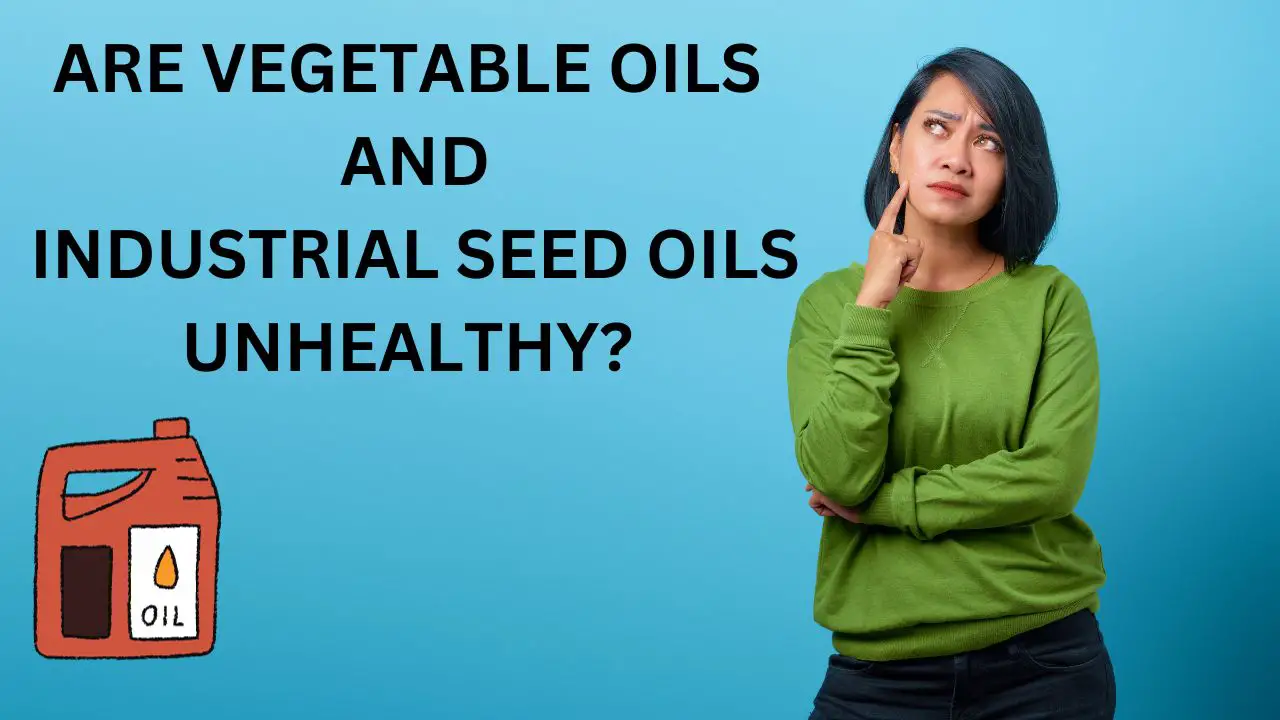Physical Address
304 North Cardinal St.
Dorchester Center, MA 02124
Physical Address
304 North Cardinal St.
Dorchester Center, MA 02124

Vegetable oils, including industrial seed oils like soybean, corn, canola, and sunflower oil, have become staples in modern diets. They are widely used in cooking, baking, and processed foods. While these oils are promoted as heart-healthy alternatives to saturated fats, concerns have arisen about their true health effects. This article explores the varieties and sources of oils, its processing, health concerns and healthy alternatives to be opt.

Origin: Derived from canola seeds, a type of rapeseed.
Properties: low in saturated fats, rich in monounsaturated fats, and containing omega-3 fatty acids.
Common Uses: Frequently utilized for frying, baking, and as a component in salad dressings.
Origin: extracted from soybeans
Properties: It possesses a neutral flavor and boasts a high smoke point, making it suitable for diverse cooking techniques.
Common Uses: Prevalent in numerous processed foods and favored for deep frying.
Origin: Manufactured from corn germ
Properties: It contains a moderate quantity of polyunsaturated fats and is a popular choice for frying and baking.
Typical Uses: Found in numerous snack products and frequently employed in fast-food establishments.
Origin: Obtained from sunflower seeds.
Properties: exhibits a high smoke point and possesses a mild flavor profile, rendering it ideal for high-temperature cooking.
Common Applications: Used for frying, sautéing, and as a foundational ingredient in salad dressings.
Industrial seed oils are extracted from seeds using mechanical pressing or chemical solvents. The extraction process can expose the oils to high heat and chemical treatments, potentially leading to the formation of harmful compounds like trans fats and oxidation products. These processing methods can compromise the oils' nutritional quality and safety.
Consuming excessive amounts of omega-6 fatty acids, which are predominantly present in vegetable oils, can disturb the optimal omega-6 to omega-3 ratio in your diet. This disruption has been associated with chronic inflammation, a factor in conditions like heart disease, arthritis, and cancer.
Vegetable oils are vulnerable to oxidation when they come into contact with heat, light, or air. When oils become oxidized, they can release free radicals in the body, potentially leading to cellular damage and an elevated risk of chronic illnesses.
The processing of vegetable oils can result in the removal of advantageous nutrients and antioxidants that were initially present in the source seeds. This depletion further diminishes the oils' nutritional quality.
Some vegetable oils go through a procedure known as partial hydrogenation, leading to the creation of trans fats. These trans fats are notorious for their capacity to increase levels of LDL cholesterol, often termed “bad” cholesterol, while simultaneously lowering HDL cholesterol, commonly referred to as “good” cholesterol. This adverse shift in the lipid profile significantly raises the risk of heart disease. As a result, health authorities emphatically recommend reducing trans-fat consumption to the maximum extent feasible.
Excessive consumption of vegetable oils, particularly when utilized in processed and fast-food preparations, has been linked to increased body weight and obesity. These oils are rich in calories, and their overconsumption may contribute to an unhealthy surplus of energy. Moreover, they can influence feelings of fullness and encourage overeating, possibly resulting in obesity, a recognized risk factor for various health complications.
For individuals who are mindful of the potential health drawbacks associated with vegetable oils, various substitute options can be contemplated:
Extra virgin olive oil is rich in monounsaturated fats and antioxidants, boasting a well-established record of health benefits.
Avocado oil represents an alternative source of monounsaturated fats, presenting a subtle and agreeable flavor profile.

Although coconut oil contains a high proportion of saturated fats, certain investigations propose that it may possess distinct health advantages, though its consumption should be moderated.
In conclusion, although vegetable oils and industrial seed oils are widely used, concerns about their omega-6 content, potential oxidation, trans fat formation, and nutrient loss during processing persist. Healthier alternatives such as olive oil, avocado oil, and even coconut oil, when used in moderation, offer potential benefits. Making informed dietary choices, focusing on unprocessed oils, and consulting with healthcare professionals or dietitians can help individuals strike a balance that aligns with their health goals. Ultimately, mindful consumption and a diverse diet rich in whole foods are key to promoting well-being.
No, eliminating all vegetable oils from your diet may not be necessary or practical. Instead, focus on moderation, choosing healthier alternatives when possible, and maintaining a balanced overall diet for optimal health.
You can make informed choices by opting for unprocessed, natural oils, considering your dietary needs and goals, and consulting with healthcare professionals or registered dietitians for personalized guidance on incorporating oils into your diet.
Coconut oil is high in saturated fat, and excessive consumption may raise LDL cholesterol levels. Moderation is key when incorporating coconut oil into your diet.
To prevent oxidation, store vegetable oils in a cool, dark place, tightly sealed in opaque or dark-colored containers. Refrigeration may be necessary for oils prone to quick spoilage.